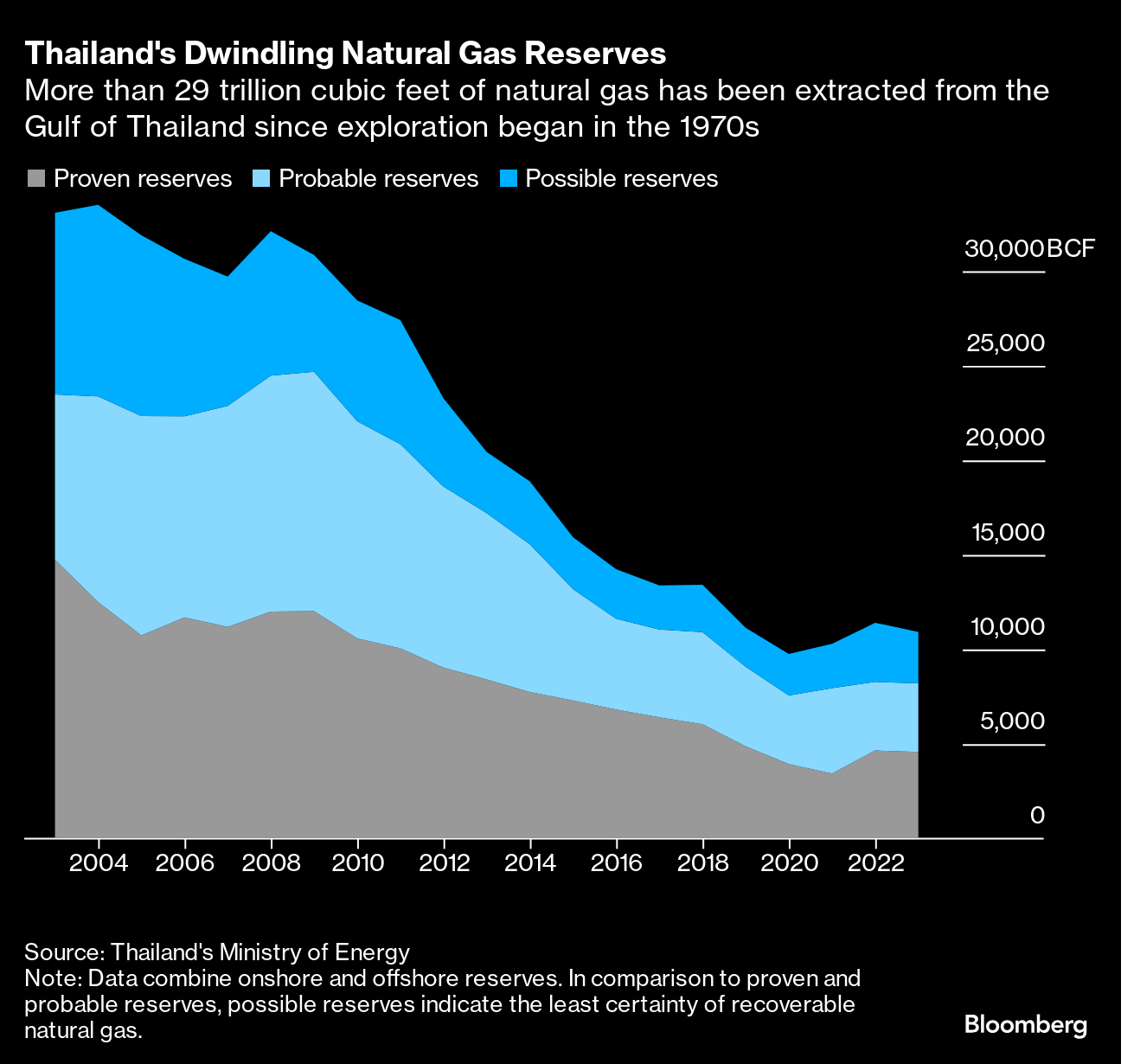Thailand Eyes $300 Billion Gas Field Frozen by Cambodia Dispute
(Bloomberg) -- Thailand’s new government will restart negotiations with Cambodia to explore an offshore oil and gas field with at least $300 billion worth of reserves that the two countries have been squabbling over since the 1970s.
Prime Minister Paetongtarn Shinawatra, who took office in September, said the joint exploration is among her administration’s top 10 urgent goals as the country seeks to boost dwindling reserves, and contain electricity prices and a ballooning fuel imports bill.
The neighbors agreed earlier this year to discuss how to fairly exploit the 26,000-square kilometer block that is estimated to contain about 10 trillion cubic feet of natural gas and 300 million barrels of crude oil. The process won’t be easy, given their history of diplomatic spats and sensitivities on both sides over ceding sovereignty. Negotiations have stalled since 2001, when the countries agreed that territorial claims must be discussed at the same time as joint resource development.
But some in Thailand are hopeful the urgency of declining domestic gas production and reserves, and a closing window for fossil fuel use, will finally bring about a breakthrough allowing the nations to start exploration now and resolve territorial issues later.

“We don’t need to resolve the different opinions on boundaries, we just need to have neighborly chats and try to make use of the resources,” Finance Minister Pichai Chunhavajira said in parliament last month. “That will boost security as well as cut utility costs.”
Cambodia remains committed to discussing the issue with Thailand, government spokesperson Pen Bona said in a statement to Bloomberg News. “If the new government of Thailand is ready, we are happy to continue the negotiations,” he said.
Natural gas meets 60% of Thailand’s power needs, with domestic supply accounting for more than half of that. At the current rate of consumption, the country could run out of gas in five to 10 years. There’s also concern about Thailand’s ability to meet rising power demand as the major auto and tourism hub attempts to attract energy-intensive data centers.
“Without doing anything, we’ll need to import much more LNG to meet the demand for power generation,” said Kurujit Nakornthap, executive director of the independent Petroleum and Energy Institute of Thailand. The unexplored reserves are expected to extend the country’s offshore gas supply by at least 20 years, he added.
Revenue Sharing
Both Thailand and Cambodia have floated revenue sharing models in the region known as the Overlapping Claims Area, which, according to former energy minister Pichai Naripthaphan, contains resources worth at least 10 trillion baht ($300 billion). A successful negotiation will likely benefit companies like Chevron Corp., Shell Plc, and Thailand’s own PTT Exploration & Production Pcl, which won concessions back in the 1970s but have not been able to undertake any exploration in the disputed area. ConocoPhillips and TotalEnergies SE were reported by local media to have won concession rights in Cambodia.
Cambodia has fewer reasons to rush to the negotiating table even though it’s almost entirely dependent on foreign fuel. Unlike Thailand, the smaller country lacks a robust domestic oil and gas industry and will likely remain dependent on its neighbors for energy imports and fuel supply.
“Regardless of the revenue sharing model, Thai producers and contractors would need to undertake the bulk of the work in the overlapping claims area, and Thai companies would walk away the biggest winners,” Bangkok-based consultancy CLC Asia said in report last year.
For Thailand, the precedent exists for joint exploration. In 1979, it agreed with Malaysia on common boundaries in the lower Gulf of Thailand and marked a relatively small area of 7,250 square kilometers for an ongoing joint development project. As for the dispute with Cambodia, a Thai government spokesperson said negotiations are among the prime minister’s priorities but declined to provide a timeline.
Still, some critics say Thailand should seek to resolve the overlapping claims area first, like with Malaysia, before discussing mutual benefits of commercial exploration.
“If it proceeds, the negotiation won’t be finished but the government will,” said former senator Somchai Swangkarn, adding that any compromise on Thai sovereignty will spark public backlash against the government. “We must negotiate delimitations first. That’s the only way.”
©2024 Bloomberg L.P.





